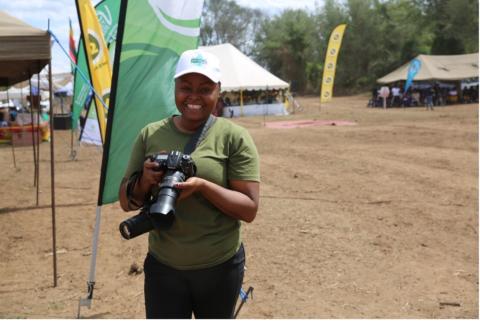Female journalists’ experiences and challenges in covering climate change in Zimbabwe
Submitted by fkakooza on

2024, under theme “Press for the Planet; Journalism in the face of the Environment Crisis”, the country was drawn to the attention its female journalists face in covering climate change. Drought, flush floods and other dramatic weather changes have disrupted the lives of many communities, especially women, that the work of journalists remains crucial role in bringing attention to the urgent need for action to address the climate and environmental crisis.
Even with increase in the number of journalists reporting environmental issues, there are several challenges journalists, especially the female face in covering the beat. According to Shoai Murwira a female environmental journalist who runs The Southern Environment blog, there are still stereotypes in the media in Zimbabwe amidst the roles of journalists to spread awareness about climate crisis and environmental issues whereby women are assigned to work on soft news beats.
“Women are usually assigned to report on soft news like court reporting, sports among others but never on climate change because they consider masculinity. Female journalists covering climate change stories are therefore not taken serious thus their perception is that a woman should not go for hard beats like environmental stories and Climate change,” Ms. Murwira noted.
The safety of female environment and Climate journalists in Zimbabwe remains crucial when it comes to covering these environmental issues. Some of the stories are political as they involve prominent political figures who try to target the lives of journalists covering the stories. It is common for journalists to disappear or be arrested in Zimbabwe. Climate change reporting in Zimbabwe tends to be interlinked to political issues, such as coal mining.
Murwira says “Chinese companies have been issued out licenses to mine and this is polluting the environment leading people to suffer from diseases yet there is no money to cater for their medication. Such stories do not favor women and women involved in covering them are threatened thus we do not want to risk our lives covering such stories. It is because of the risks and intimidation,” she says
“There have been rumors that mining companies are being given to those with political muscles so if you report on cases that have been in their mining area most of the journalists reporting on such stories are being threatened, most of female journalists have families yet they are travelling in search for these environmental stories and we are always threated by the owners of such mining companies.”
Murwira gives an example of how a female journalist was scared to visit the Shabanie Mines in January 2024, after 10 people were killed and 11 were rescued because the owners of the company responsible are top political officials with potential to cause the arrest or disappearance of the arrest journalists.
Environmental issues are also very expensive to cover. Zimbabwe is relatively large country that in some cases, a journalist needs to travel for more than 400km to assess the effect and interview the affected people.
In the midst of those challenges, the chairperson of the Media Institute of Southern Africa (Zimbabwe chapter), Mr. Golden Mauganidze for the 2024 World Press Freedom Day he asked the media to continue amplifying environmental issues and climate change due to its urgency globally. “By focusing and amplifying the voices of those on the frontlines of climate crisis, we can bring attention to the specific vulnerabilities and adaptations needed in Zimbabwe and the Southern African Regions,” Mr. . Mauganidze noted in a statement.
Several initiatives have been put in place to create awareness and facilitate Zimbabwean female journalists to compete for grants at international level as a way of improving their capacity to report environmental stories. Such capacity building has been provided by the Voluntary Media Council of Zimbabwe (VMCZ) and the Global Investigative Journalism Network.
- 91 reads
